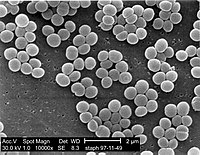
Photo from wikipedia
Background Gram-positive cocci are clinically important pathogens that cause infections and their development of antibiotic resistance continues to pose a severe threat to public health. Therefore, this study aims to… Click to show full abstract
Background Gram-positive cocci are clinically important pathogens that cause infections and their development of antibiotic resistance continues to pose a severe threat to public health. Therefore, this study aims to investigate the level of antimicrobial resistance among Gram-positive cocci isolated from different clinical samples among patients referred to Arsho Advanced Medical Laboratory, Addis Ababa, Ethiopia. Methods From January to April 2018, a cross-sectional study was conducted at Arsho Advanced Medical Laboratory. Seven hundred ninety-two (792) different clinical samples were obtained from 792 individuals and inoculated into blood culture bottles and Blood Agar base. Bacterial identification was done using the number, type, and morphology of colonies, as well as Gram staining, catalase testing, and coagulase test after isolation of pure growth on culture media using the standard operating procedure. VITEK 2 compact system was used for bacterial identification and drug susceptibility testing. The information entry and analysis were performed by using SPSS version 20. Results Out of 792 clinical samples cultured, the prevalence of Gram-positive cocci was 12.6% (n=100/792). The most frequent one is S. aureus 54% (n=54/100) followed by coagulase-negative Staphylococcus species 42% (n=42/100), S. agalactiae 1% (n=1/100) and E. faecalis 3% (n=3/100). Penicillin showed the highest resistance rate 85% (n=85/100), followed by sulfamethoxazole/trimethoprim (47%), and oxacillin (38%); however, highest sensitivity was seen towards linezolid 97% (n=97/100) and vancomycin 94% (n=94/100). The total multi-drug resistance (MDR) Gram-positive cocci were 44% (n=44/100). Conclusion This study demonstrated high antimicrobial resistance and multi-drug resistance. This suggests that the importance of continuous monitoring of antimicrobial resistance patterns is crucial for selecting the suitable drug for treatment and infection prevention.
Journal Title: Infection and Drug Resistance
Year Published: 2022
Link to full text (if available)
Share on Social Media: Sign Up to like & get
recommendations!